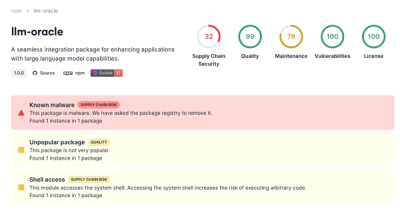
Security News
Python Overtakes JavaScript as Top Programming Language on GitHub
Python becomes GitHub's top language in 2024, driven by AI and data science projects, while AI-powered security tools are gaining adoption.
@typescript-eslint/typescript-estree
Advanced tools
A parser that converts TypeScript source code into an ESTree compatible form
The @typescript-eslint/typescript-estree package is a parser that converts TypeScript source code into an ESTree-compatible form. It is primarily used in the context of ESLint to enable linting of TypeScript code by converting TypeScript syntax into a format that ESLint can understand and work with.
Parsing TypeScript code to ESTree
This feature allows you to parse TypeScript code and get an Abstract Syntax Tree (AST) that is compatible with ESTree. This is useful for tools that need to analyze or manipulate the syntax of TypeScript code.
const tsEStree = require('@typescript-eslint/typescript-estree');
const code = 'let x: number = 1;';
const ast = tsEStree.parse(code, { jsx: false });
console.log(ast);Parsing TypeScript code with JSX
This feature is similar to the previous one but includes support for JSX syntax, which is commonly used in React applications. It allows the parser to correctly interpret JSX elements within TypeScript code.
const tsEStree = require('@typescript-eslint/typescript-estree');
const code = '<div>Hello, TypeScript!</div>';
const ast = tsEStree.parse(code, { jsx: true });
console.log(ast);Parsing a file
This feature allows you to parse the contents of a TypeScript file by reading the file and then parsing the code. It is useful when you want to analyze or lint a file directly.
const tsEStree = require('@typescript-eslint/typescript-estree');
const fs = require('fs');
const filePath = './example.ts';
const code = fs.readFileSync(filePath, 'utf8');
const ast = tsEStree.parse(code, { filePath });
console.log(ast);This package was the predecessor to @typescript-eslint/typescript-estree and has been deprecated in favor of the newer package. It provided similar functionality in terms of parsing TypeScript code for ESLint.
babel-eslint is a parser that allows ESLint to run on source code that is transpiled with Babel. While it is not TypeScript-specific, it can be used with Babel's TypeScript preset to parse TypeScript code.
Espree is the default parser for ESLint and is built on top of Acorn. It is designed to parse ECMAScript (JavaScript) code. While it does not natively support TypeScript, it serves a similar purpose for JavaScript code as @typescript-eslint/typescript-estree does for TypeScript.
@typescript-eslint/typescript-estreeA parser that produces an ESTree-compatible AST for TypeScript code.
👉 See https://typescript-eslint.io/packages/typescript-estree for documentation on this package.
See https://typescript-eslint.io for general documentation on typescript-eslint, the tooling that allows you to run ESLint and Prettier on TypeScript code.
6.3.0 (2023-08-07)
allowTypeImports enabled (#7379) (cc9a46d)ignorePrimitives option to be true (#7331) (dfcafae)You can read about our versioning strategy and releases on our website.
FAQs
A parser that converts TypeScript source code into an ESTree compatible form
We found that @typescript-eslint/typescript-estree demonstrated a healthy version release cadence and project activity because the last version was released less than a year ago. It has 2 open source maintainers collaborating on the project.
Did you know?

Socket for GitHub automatically highlights issues in each pull request and monitors the health of all your open source dependencies. Discover the contents of your packages and block harmful activity before you install or update your dependencies.

Security News
Python becomes GitHub's top language in 2024, driven by AI and data science projects, while AI-powered security tools are gaining adoption.

Security News
Dutch National Police and FBI dismantle Redline and Meta infostealer malware-as-a-service operations in Operation Magnus, seizing servers and source code.

Research
Security News
Socket is tracking a new trend where malicious actors are now exploiting the popularity of LLM research to spread malware through seemingly useful open source packages.